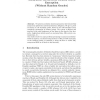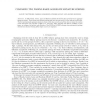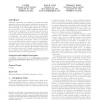101 search results - page 9 / 21 » Efficient Intrusion-Resilient Signatures Without Random Orac... |
CRYPTO
2006
Springer
13 years 11 months ago
2006
Springer
We present an identity-based cryptosystem that features fully anonymous ciphertexts and hierarchical key delegation. We give a proof of security in the standard model, based on the...
DCC
2010
IEEE
13 years 7 months ago
2010
IEEE
In 2003, Boneh, Gentry, Lynn and Shacham (BGLS) devised the first provably-secure aggregate signature scheme. Their scheme uses bilinear pairings and their security proof is in the...
EUROCRYPT
2010
Springer
13 years 7 months ago
2010
Springer
We investigate the possibility to prove security of the well-known blind signature schemes by Chaum, and by Pointcheval and Stern in the standard model, i.e., without random oracle...
IACR
2011
12 years 7 months ago
2011
Although malleability is undesirable in traditional digital signatures, schemes with limited malleability properties enable interesting functionalities that may be impossible to o...
CRYPTO
2001
Springer
14 years 1 hour ago
2001
Springer
d Abstract) Philip MacKenzie and Michael K. Reiter Bell Labs, Lucent Technologies, Murray Hill, NJ, USA We describe a means of sharing the DSA signature function, so that two parti...



